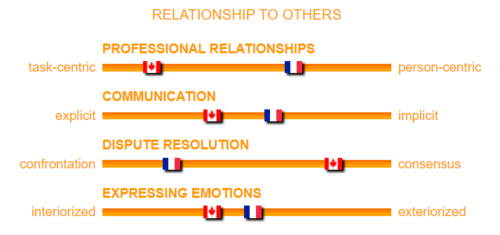I'm not rude, I'm French!
Have you heard of this story? Apparently, one can take advantage of one's French culture to justify behavior considered by others to be "inappropriate"!

Boss, it's not me! It's my culture... French
Have you heard of this story?
Apparently, one can take advantage of one's French culture to justify behavior considered by others to be "inappropriate"! At least that's the line of defense adopted by a French waiter fired by a Vancouver restaurateur for "rude, aggressive and disrespectful" behavior. A court found the complaint admissible and must rule soon.
When I heard this story, I admit I thought it was a hoax, but the press is unanimous: it's all true. The waiter would have admitted his tendency, typically French according to him, to be “more direct and more expressive” than his Canadian entourage. His “direct, honest and professional” attitude would have been the subject of cultural discrimination, since it was a characteristic trait of his French culture, misinterpreted by his interlocutors.
Task-oriented or person-oriented professional relationships
First of all, we could question the positioning of those involved on the Task/Relationship axis. When we have to accomplish a task, some of us are primarily focused on its purpose, its results and the skills required. It's essentially a question of know-how.
Others give more importance to how to carry out this task, particularly in terms of relationships with others (colleagues or clients). For people located on the “Relationship” side of the axis, technicality cannot lead to success without soft skills and relational intelligence.
The employee in question, whose technical skills his former employers recognize, thus seems to clearly lean towards the task. From this point of view, according to the intercultural literature, the explanation of this discrepancy is not to be sought on this dimension. Indeed, French culture would be more “Relationship” oriented than Canadian culture.
Resolving disagreements in opposition or consensus
Let's then take a look at how to resolve disagreement (confrontation vs consensus). How could the Canadians have interpreted as “rude, aggressive and disrespectful” what the French waiter pointed out as a “more direct and more expressive” way of being?
Canadians, while being quite direct in their mode of communication, are on the side of avoiding conflict, of consensus, believing that disagreement and discontent must be expressed while respecting the rules of politeness and preservation. of harmony.
The French, passionate about contradictory debate and encouraged by the famous adage “we must burst the abscess [1]”, have a certain tendency to approach any difference of opinion as a question of life or death. May the strongest win! They are therefore very clearly on the confrontational side, without too much regard for the consequences that this can have on the relationship.
This is neither good nor bad, as it is all a matter of perception and preference. There are cultures where direct confrontation is even stronger than in France. And countries where harmony and the avoidance of conflict are even more sought after than in Canada. Everything is relative and in the field of intercultural relations this is undoubtedly more obvious than elsewhere.
This story reminds us, if necessary, that the problems come less from difference than from the lack of flexibility and adaptation of the protagonists.
[1]In my conferences, I often recall the interest of proverbs and popular sayings in understanding a culture. Did you know that the expression "to burst the abscess", to indicate the desire to resolve a difficult situation, has no equivalent in English, Italian, Spanish or Portuguese?

